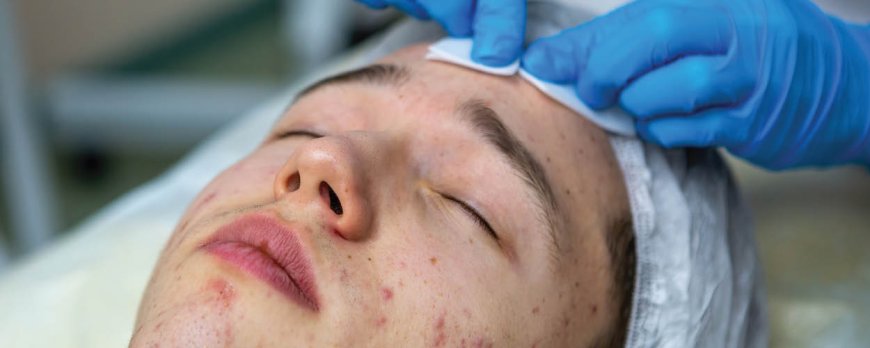Is cystic acne always PCOS?
Uncover the truth: Is cystic acne always PCOS? Learn more about the complex relationship between this skin condition and hormonal imbalance here.

Is cystic acne always PCOS?
Cystic acne is a severe form of acne that is often associated with PCOS (polycystic ovary syndrome), a hormone disorder that affects women. PCOS can cause acne in areas such as the lower face, including the cheeks, jawline, chin, and upper neck. However, it is important to understand that cystic acne is not always a clear indication of PCOS. There are other hormonal disorders that can also cause acne, albeit less commonly.
Key Takeaways:
- Cystic acne is often associated with PCOS, but it is not always a sure sign of this hormonal disorder.
- Other hormonal disorders can also cause acne, although they are less common.
- Acne can be caused by a variety of factors, including excess oil production, dead skin cells, bacteria, hormonal changes, stress, and certain medications.
- Over-the-counter acne medications may not be effective for hormonal acne, and treating the underlying hormonal imbalance is necessary.
- Treatment options for PCOS-related acne include oral contraceptives, anti-androgen drugs, and retinoids.
It is important to understand the various factors that contribute to the development of cystic acne and to seek professional help in order to accurately diagnose and effectively treat acne symptoms. Making dietary changes and following a good skincare routine are also crucial in managing acne. Additionally, PCOS is associated with other symptoms such as unwanted hair growth and an increased risk of sleep apnea. Consulting a dermatologist, endocrinologist, or OB/GYN is recommended for addressing both acne and PCOS symptoms.
The Complex Relationship between Cystic Acne and PCOS
Polycystic ovary syndrome (PCOS) is a hormone disorder that can lead to the development of cystic acne, primarily in certain areas of the face. In individuals with PCOS, acne is often concentrated on the lower face, including the cheeks, jawline, chin, and upper neck. While cystic acne is frequently associated with PCOS, it is essential to recognize that other hormonal disorders can also cause acne, although they are less common.
Acne occurs when there is an overproduction of oil, known as sebum, combined with the accumulation of dead skin cells and bacterial growth. Hormonal changes, such as those seen in PCOS, can disrupt the delicate balance of hormones in the body, leading to an increased production of sebum and clogged pores. This excess sebum, along with bacteria, triggers inflammation and the formation of painful, deep cysts beneath the surface of the skin.
When it comes to addressing cystic acne caused by PCOS, over-the-counter acne medications may not be as effective as treating the underlying hormonal imbalance. Healthcare professionals often recommend oral contraceptives, which can help regulate hormone levels and reduce acne symptoms. Anti-androgen drugs, such as spironolactone, may also be prescribed to block the effects of male hormones on the skin. Additionally, retinoids, derived from vitamin A, are commonly used to unclog pores and promote cellular turnover, reducing the occurrence of cystic acne.
The Importance of Seeking Professional Help
- If you suspect that your cystic acne is related to PCOS or any other hormonal disorder, it is crucial to consult with a healthcare professional for an accurate diagnosis and appropriate treatment options.
- Differentiating the underlying cause of your acne is vital, as it will determine the most effective approach for managing and improving your skin condition.
Furthermore, dermatologists, endocrinologists, and OB/GYNs are specialists who can provide invaluable guidance and expertise in both diagnosing and treating acne and PCOS symptoms. They can tailor treatment plans to address your specific needs, recommend lifestyle modifications, and monitor your progress to help you achieve clearer, healthier skin.
In conclusion, while cystic acne is strongly associated with PCOS, it is not exclusive to this hormonal disorder. Understanding the complex relationship between cystic acne and PCOS can help individuals seek appropriate professional help and find effective treatment options for managing their acne symptoms.

Understanding hormonal acne and its causes
Cystic acne is often linked to hormonal imbalances, including those seen in PCOS, due to the influence of hormones on sebum production and skin cell turnover. Hormonal imbalances, such as elevated levels of androgens (male hormones) or insulin resistance, can disrupt the delicate balance of hormones in the body, leading to the development of cystic acne.
When hormonal imbalances occur, the sebaceous glands in the skin produce excess sebum, an oily substance that can clog pores and create the ideal environment for acne-causing bacteria to thrive. Additionally, hormonal fluctuations can stimulate the growth of skin cells, causing them to shed at a faster rate. This combination of increased sebum production and rapid skin cell turnover can lead to the formation of deep, painful cystic acne lesions.
While PCOS is a common hormonal disorder associated with cystic acne, it is important to note that other conditions, such as adrenal gland disorders or hormonal imbalances caused by certain medications, can also contribute to the development of hormonal acne. In these cases, addressing the underlying hormonal imbalance is crucial for effectively managing acne symptoms.
Common causes of hormonal acne:
- Elevated levels of androgens, such as testosterone
- Insulin resistance or elevated insulin levels
- Adrenal gland disorders
- Hormonal fluctuations during the menstrual cycle
- Certain medications, such as corticosteroids or anticonvulsants
It is important to understand that treating hormonal acne requires a comprehensive approach that targets the underlying hormonal imbalance. Over-the-counter acne medications may not be effective in managing cystic acne caused by hormones, as they do not address the root cause of the problem. Consulting with a healthcare professional, such as a dermatologist or endocrinologist, is recommended to develop an individualized treatment plan that may involve medications, lifestyle modifications, and skincare regimens tailored to address the hormonal imbalances contributing to the acne.

Factors contributing to cystic acne development
Several factors can contribute to the development of cystic acne, including hormonal changes, excess oil production, and the presence of acne-causing bacteria. Understanding these underlying factors is crucial in effectively managing and treating cystic acne.
Hormonal changes:
Hormonal imbalances, such as those associated with PCOS, can trigger the overproduction of sebum, the oily substance that lubricates the skin. This excess sebum, coupled with the skin's natural shedding process, can clog the hair follicles and lead to the formation of acne lesions. Hormonal fluctuations during puberty, menstruation, pregnancy, and menopause can also contribute to the development of cystic acne.
Excess oil production:
Individuals with oily skin are more prone to developing acne, including cystic acne. Overactive sebaceous glands produce an excess of sebum, which can mix with dead skin cells, bacteria, and other impurities to form inflammatory acne lesions. When these lesions are deep within the skin, cystic acne can result.
Acne-causing bacteria:
The presence of Propionibacterium acnes, a bacteria that naturally resides on the skin, can contribute to the development of cystic acne. When follicles become clogged, it creates an anaerobic environment that promotes the growth of this bacteria. The inflammatory response triggered by the bacteria leads to the formation of painful, deep nodules and cysts.
It's important to note that while these factors play a significant role in the development of cystic acne, each individual's experience may vary. Consulting with a healthcare professional, such as a dermatologist, can help determine the underlying cause of cystic acne and guide appropriate treatment options.
The link between PCOS and cystic acne
PCOS is known to cause hormonal imbalances, which can lead to the development of cystic acne in affected individuals. The hormonal fluctuations associated with PCOS can trigger an overproduction of oil in the skin, leading to clogged pores and the formation of cysts beneath the surface. These cysts are often deep, painful, and can leave behind scars.
In individuals with PCOS, cystic acne tends to occur in specific areas of the face. The lower face, including the cheeks, jawline, chin, and upper neck, are particularly prone to acne breakouts. These areas are rich in oil glands, making them more susceptible to the effects of hormonal imbalances.
However, it's important to note that cystic acne is not always synonymous with PCOS. While PCOS is a common cause of hormonal acne, there are other hormonal disorders that can also lead to the development of cystic acne, although they are less prevalent. It is recommended to consult with a healthcare professional for an accurate diagnosis and appropriate treatment.
The correlation between PCOS and cystic acne:
- PCOS can cause hormonal imbalances, which can trigger excessive oil production in the skin.
- Excess oil production can lead to clogged pores and the formation of deep, painful cysts.
- Cystic acne commonly appears in the lower face, including the cheeks, jawline, chin, and upper neck.
- While PCOS is a frequent cause of cystic acne, other hormonal disorders can also contribute to its development.
Managing cystic acne associated with PCOS involves treating the underlying hormonal imbalance. This may involve medications such as oral contraceptives, anti-androgen drugs, or retinoids. Additionally, making dietary changes and following a skincare routine tailored to acne-prone skin are important for managing symptoms.
It is essential to remember that the impact of PCOS extends beyond cystic acne. Other symptoms of PCOS include unwanted hair growth and an increased risk of sleep apnea. Seeking professional help from a dermatologist, endocrinologist, or OB/GYN is crucial in addressing both the acne and PCOS symptoms effectively.

Treatment options for PCOS-related acne
Treatment options for PCOS-related acne vary and may include medications such as oral contraceptives, anti-androgen drugs, and retinoids, in addition to lifestyle modifications. These treatment approaches aim to address the underlying hormonal imbalances that contribute to acne development in individuals with PCOS.
1. Oral contraceptives: Birth control pills that contain estrogen and progestin can help regulate hormone levels, reducing the production of androgens that contribute to acne formation. Some oral contraceptives are specifically FDA-approved for treating acne.
2. Anti-androgen drugs: Medications such as spironolactone can block the effects of androgens on the skin, reducing oil production and preventing clogged pores. Anti-androgens are most effective in treating acne that appears in the lower face and can be prescribed alongside oral contraceptives.
3. Retinoids: These topical medications derived from vitamin A help unclog pores and reduce inflammation. Retinoids work by speeding up the skin's cell turnover process, preventing the formation of new acne lesions. Prescription-strength retinoids, such as tretinoin or adapalene, are commonly used for treating cystic acne.
In addition to medications, certain lifestyle modifications can also help manage PCOS-related acne:
- Follow a balanced diet: Consuming a diet low in refined sugars and carbohydrates can help stabilize hormone levels and reduce acne breakouts. Incorporate plenty of fruits, vegetables, whole grains, and lean proteins into your meals.
- Maintain a consistent skincare routine: Cleanse your face twice daily with a gentle cleanser and use non-comedogenic products to prevent further clogging of pores. Incorporate products with ingredients like salicylic acid or benzoyl peroxide to target acne.
- Avoid picking or squeezing acne lesions: Picking at acne can worsen inflammation and increase the risk of scarring. It is best to leave the extraction of acne to a dermatologist to minimize the risk of complications.
- Manage stress levels: Stress can exacerbate acne symptoms. Engage in stress-reducing activities such as exercise, meditation, or yoga to help regulate hormones and improve overall skin health.
If you are experiencing PCOS-related acne, it is important to consult with a dermatologist, endocrinologist, or OB/GYN who specializes in hormonal imbalances. They can provide a personalized treatment plan tailored to your specific needs and help you effectively manage both the acne and PCOS symptoms.
Managing acne through dietary changes and skincare routine
In addition to medical treatments, making dietary changes and following a proper skincare routine can play a role in managing PCOS-related acne. While these measures may not directly address the underlying hormonal imbalance, they can help improve the appearance and overall health of the skin.
To manage acne through dietary changes, it is important to focus on a balanced and nutritious diet. Incorporating foods that are rich in antioxidants, such as fruits, vegetables, and whole grains, can help reduce inflammation and promote healthy skin. Additionally, avoiding processed foods, sugary snacks, and greasy foods can minimize the production of excess oil in the skin, which can contribute to acne breakouts.
Furthermore, maintaining a consistent skincare routine is essential in managing PCOS-related acne. Using gentle cleansers that are specifically formulated for acne-prone skin can help remove dirt, oil, and bacteria without causing further irritation. It is important to avoid harsh scrubbing or using abrasive products, as this can disrupt the skin's natural barrier and exacerbate acne. Additionally, incorporating non-comedogenic moisturizers and sunscreen can help keep the skin hydrated and protected.
It is worth noting that everyone's skin is unique, and what works for one person may not work for another. Therefore, it is recommended to consult with a dermatologist or skincare specialist to develop a personalized skincare routine that suits your specific needs. They can provide guidance on the most suitable products and ingredients to incorporate into your routine, as well as offer additional treatments, such as chemical peels or microdermabrasion, if necessary.
Other symptoms of PCOS
PCOS (polycystic ovary syndrome) can manifest in various symptoms beyond cystic acne, including unwanted hair growth and an increased risk of sleep apnea. These symptoms can greatly impact the quality of life for individuals with PCOS, highlighting the need for effective management and treatment.
Unwanted hair growth, or hirsutism, is a common symptom of PCOS. This excess hair growth typically occurs in areas such as the face, chest, back, and abdomen. It can be a source of significant distress and can affect self-esteem and body image. While hirsutism can be managed through various methods such as laser hair removal, waxing, or medication, addressing the underlying hormonal imbalance is crucial for long-term improvement.
Sleep apnea, a sleep disorder characterized by breathing interruptions during sleep, is another symptom that individuals with PCOS may experience. Research has shown that women with PCOS have a higher risk of developing sleep apnea compared to those without the condition. The exact underlying mechanisms are still being studied, but hormonal imbalances, obesity, and insulin resistance are believed to play a role. It is important to recognize the signs of sleep apnea, such as excessive daytime sleepiness, loud snoring, and frequent awakenings during the night, and seek appropriate medical evaluation and treatment.
Managing PCOS symptoms
When dealing with PCOS, it is essential to address not only the visible symptoms, such as cystic acne, but also the other symptoms that can affect overall well-being. Seeking help from healthcare professionals, such as dermatologists, endocrinologists, or OB/GYNs, can provide accurate diagnosis and guidance on effective treatment strategies tailored to individual needs. Additionally, making dietary changes, following a consistent skincare routine, and maintaining a healthy lifestyle can play a significant role in managing PCOS symptoms and improving overall health and quality of life.
Seeking Professional Help for Acne and PCOS
To effectively address both the acne and PCOS symptoms, it is recommended to seek help from healthcare professionals specializing in dermatology, endocrinology, or obstetrics and gynecology. These specialists have the expertise and knowledge to diagnose and treat the underlying causes of acne, particularly in individuals with PCOS.
A dermatologist is often the first healthcare professional to consult for acne-related concerns. They can evaluate the severity of the acne, identify any underlying skin conditions, and recommend appropriate treatment options. Dermatologists may recommend topical medications, oral medications, or procedures such as chemical peels or laser therapy to manage acne.
If PCOS is suspected as the cause of acne, consulting an endocrinologist can be beneficial. Endocrinologists specialize in hormonal disorders and can conduct comprehensive evaluations to determine if PCOS is the underlying hormonal imbalance. They can offer treatment options such as oral contraceptives, anti-androgen drugs, or insulin-sensitizing medications to address the hormonal aspect of acne.
Additionally, an obstetrician and gynecologist (OB/GYN) can play a crucial role in managing PCOS-related symptoms, including acne. They can conduct diagnostic tests, monitor hormone levels, and provide guidance on lifestyle changes and contraceptive methods that can help regulate hormonal imbalances associated with PCOS. Their expertise in reproductive health makes them valuable partners in addressing both acne and PCOS symptoms.
Remember, seeking professional help is essential to ensure an accurate diagnosis and appropriate treatment plan tailored to your specific needs. Dermatologists, endocrinologists, and OB/GYNs understand the complexities of acne and PCOS and can provide personalized recommendations to help you effectively manage your symptoms.
Conclusion
Cystic acne is often associated with PCOS, a hormone disorder, but it is not always the sole cause. Understanding the relationship between cystic acne and PCOS is crucial for effective diagnosis and treatment.
PCOS can cause acne in areas such as the lower face, including the cheeks, jawline, chin, and upper neck. However, there are other hormonal disorders that can also cause acne, although they are less common. Acne can be caused by excess oil production, dead skin cells, bacteria, hormonal changes, stress, and certain medications.
When it comes to treating hormonal acne, over-the-counter medications may not be effective, as treating the underlying hormonal imbalance is necessary. Treatment options for PCOS-related acne include oral contraceptives, anti-androgen drugs, and retinoids. It is important to consult with healthcare professionals, such as dermatologists, endocrinologists, or OB/GYNs, to determine the most suitable treatment plan.
Managing acne in individuals with PCOS also involves making dietary changes and establishing a good skincare routine. These lifestyle modifications can help mitigate acne symptoms and improve overall skin health. Additionally, it is worth noting that PCOS is associated with other symptoms such as unwanted hair growth and an increased risk of sleep apnea, highlighting the broader impact of the disorder on overall health.
For accurate diagnosis and tailored treatment, it is recommended to seek help from healthcare professionals who specialize in acne and PCOS. With the right guidance and treatment plan, individuals can effectively manage both the acne and PCOS symptoms, leading to improved quality of life.
FAQ
Is cystic acne always PCOS?
Cystic acne is often associated with PCOS, but it can also be caused by other hormonal disorders, although they are less common.
What causes cystic acne?
Cystic acne can be caused by factors such as excess oil production, dead skin cells, bacteria, hormonal changes, stress, and certain medications.
How can I treat PCOS-related acne?
Treatment options for PCOS-related acne include oral contraceptives, anti-androgen drugs, and retinoids. It is important to address the underlying hormonal imbalance.
Can over-the-counter acne medications help with hormonal acne?
Over-the-counter acne medications may not be effective for hormonal acne, as treating the underlying hormonal imbalance is necessary.
What lifestyle changes can help manage acne?
Making dietary changes and following a good skincare routine are important for managing acne, especially for individuals with PCOS.
What are some other symptoms of PCOS?
Other symptoms of PCOS include unwanted hair growth and an increased risk of sleep apnea.
Should I seek professional help for acne and PCOS?
It is recommended to seek help from a dermatologist, endocrinologist, or OB/GYN to address both the acne and PCOS symptoms.



































































































































